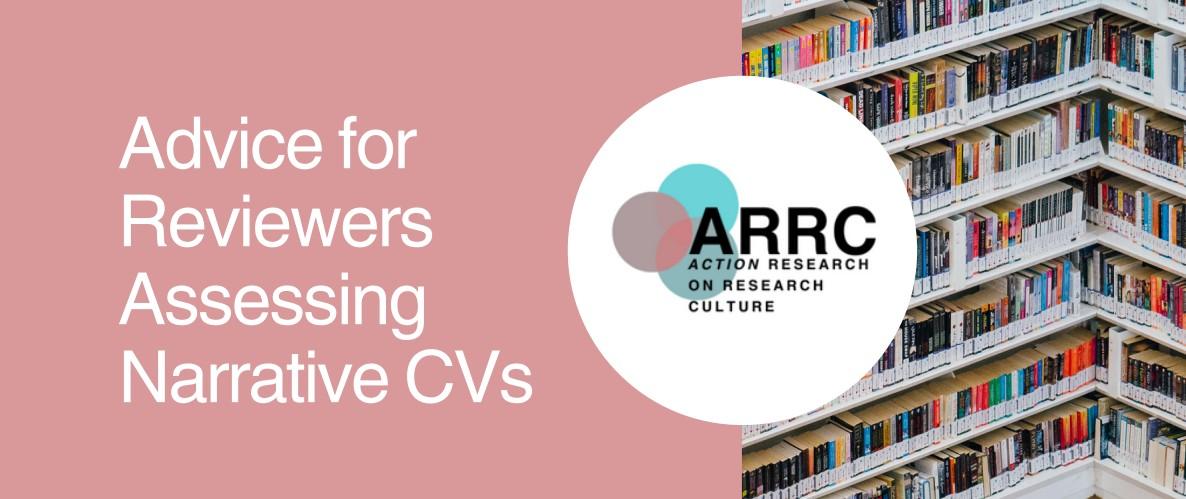
Download a PDF of Advice for Reviewers Assessing Narrative CVs prepared by the ARRC Team
The ARRC Project team worked with attendees at the 2024 IRCC at the University of Warwick to bring together this advice for reviewers of Narrative CVs. We took four questions, developed by Dr Justyna Bandola-Gill (University of Birmingham), as prompts, and asked attendees (a mix of research culture professionals, reviewers, funders, and other interested parties) to contribute their thoughts on the topics.
Contributors knew that these opinions would be brought together in this document; the content below is lightly edited for better reading. Please take these as starting points for developing your own thoughts on reviewing these new documents.
Our final section, 5, gives some opinions from attendees on how funders could better address the issue of training reviewers. Can you add to these points? Please do let us know by mailing arrcproject@admin.cam.ac.uk
Q. What advice would help reviewers not miss things?
- Be clear on reviewing criteria and purpose of narrative CV for this particular application
- Read the first few words of every single paragraph
- Don’t be put off if the author hasn’t used headings or emphasis
- Skim quickly, then go back – skim quickly to seek out the points to interrogate in more detail against the criteria
- Note author use of text format for emphasis, then look between sections for more plain text detail
Q. How should reviewers deal with EDI issues (eg neurodivergence, non-native English speakers)?
- Have you as a panel considered how representative you are and talked about your approach to EDI issues?
- Try to look beyond whether the writer’s English is perfect to the context of the CV
- Keep in mind what the purpose of the narrative CV is (it’s not a writing exercise)
- Be aware of unconscious bias influences such as specific wording choices
- Remember that activities can contribute to society without being high profile/metric-based
- Be aware of methodological biases
- Free text vs bullet points – if no advice has been given, keep an open mind on your personal preference for each writing approach
Q. How can reviewers be helped to think about comparability?
- Aim to take a holistic view
- Take into account researcher career stage, including career breaks.
- Applicants can be wary of disclosing personal information in the ‘Additions’ section; treat any disclosures sensitively
- Consider applying principles from fair recruitment and selection processes in employment, especially around
- Be careful about applicant’s use of superlatives… “innovative,” “novel”…; some applicants’ cultural backgrounds would prevent them from ‘boasting’
- Give yourself more time for review
- Keep in mind that there may be different levels of support for writing narrative CVs at different institutions.
Q. How could reviewers look beyond metrics?
- Have you agreed with your fellow panel members what your position is on metrics? If you are used to relying on metrics, you will have to develop alternative ways of assessing quality of the outputs.
- Encourage the use of more non-academic reviewers who care less about metrics
- Be aware that researchers at different career stages will populate each module differently, with potentially less emphasis on publications
- Don’t be swayed if some applicants have included metrics.
- Look for indications of impact in the narrative.
- Checklist: criteria to help reflect on the decision-making process
Q. What advice could we give funders about training?
- Funders should give more time for reviewers to carefully review the CVs. If it typically takes 2 minutes for a traditional CV review, for the narrative, maybe 4 minutes.
- Provide explicit reviewing criteria
- Be clear on whether metrics, bullet points and side-headings can be used
- Train reviewers to think very carefully about disclosures in the ‘Additions’ section
- Be clearer on the purpose of the narrative CV
- Encourage representative panels



